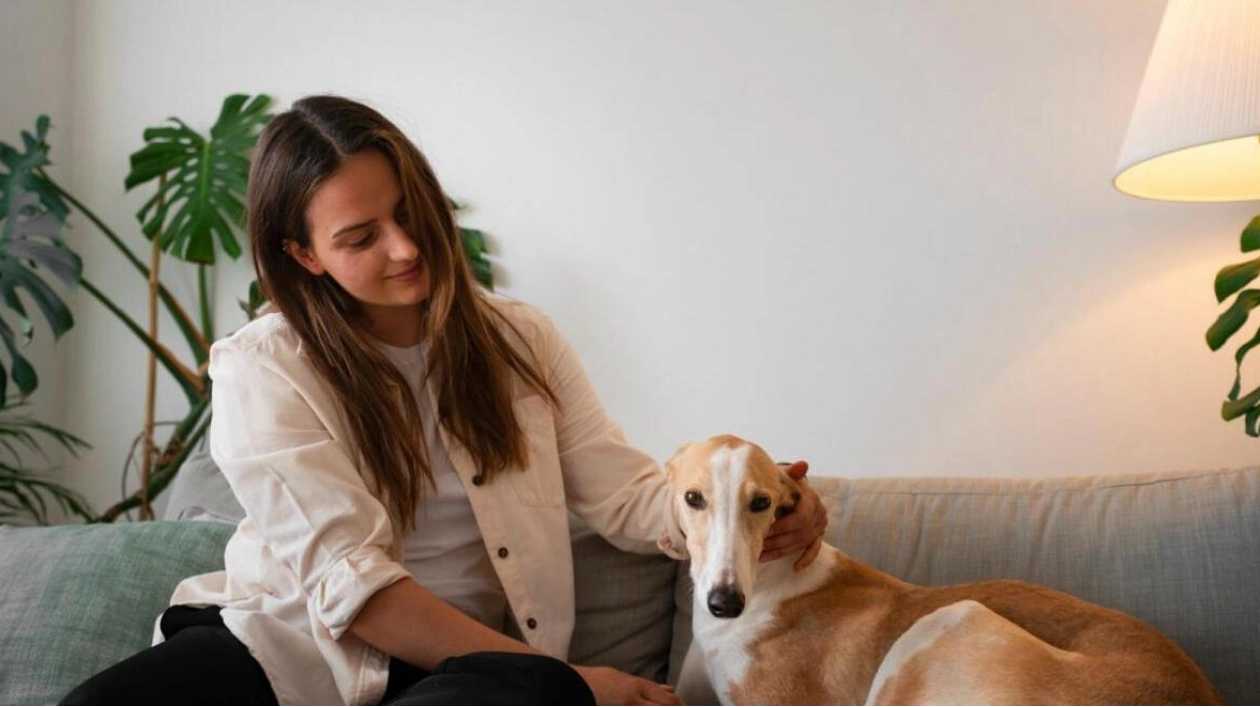Isobel Welland’s three rescue dogs have been her steadfast companions through some of life's toughest moments. From her years as an expatriate alone in the Gulf to the isolation brought on by the Covid pandemic, these dogs have provided her with as much care, companionship, and unconditional love as she has given them. “They truly saved me during Covid. I was isolating, and they were my only physical connection to another living being for months. I firmly believe that the love you give to a pet is returned a million-fold. They look after me just as much as I look after them.” Having lived with pets for most of her life, the 56-year-old Scot credits her rescue dogs and cats with significantly contributing to her mental well-being. “I suffer from chronic anxiety, and caring for them helps me focus on something other than my own thoughts. If I’m having a tough day, they motivate me to move… I have to get up because I have a responsibility to them. This often makes me feel better.”
However, not everyone finds pet ownership to be a calming experience. Fatima A., an Egyptian national, moved to the UAE at the start of the pandemic with her husband and two young children. Like many, Fatima and her husband thought a pet would be a good idea to help them through the pandemic. They adopted a newborn golden retriever just days after it was born. After the initial excitement faded, Fatima realized that raising the dog had a different impact on her mental well-being. “My kids were too young, and my husband was busy with work. So, I had to handle everything. The puppy cried and whined constantly. I didn’t know that you have to stimulate puppies to urinate and defecate. I was worried it was in pain and often didn’t know what to do.” She heavily relied on the Internet for guidance but felt the mental strain of not being a good ‘dog mum’. “I struggled because the dog struggled. I felt anxious and very guilty. I didn’t want to harm one of Allah’s creatures. It was very stressful—adding more stress to everything else going on.”
Dr. Nawfel Ayad, a psychiatrist at Reem Neuroscience Centre in Abu Dhabi, has extensively discussed the impact of pet ownership on mental health. He views it as a double-edged sword. In psychiatry, therapy animals are commonly used in various settings, including hospitals and psychiatric clinics, to alleviate anxiety, depression, and other mental health issues. Similarly, in non-clinical settings, Dr. Ayad explains that pets can be a lifeline for people struggling with their mental health. Pets, especially dogs, can help individuals establish a daily routine, which is crucial for those dealing with depression. “Dogs can sense the emotional states of their owners,” he said. “They can smell fear, depression, and sadness. In turn, they provide amazing comfort, physical warmth, and connection that can be truly healing in a moment of need. Unlike humans, they don’t need an explanation, and they won’t challenge you. They just accept you as you are.”
Pets can also serve as a bridge for social interaction. Dr. Ayad said, “People connect in public spaces with other pet owners. They can form friendships and bonds with other people by talking about their pets. People with social anxiety or paranoia who are averse to excess human contact can find companionship in their pets too.” However, an over-reliance on pets is one of the potential downsides of pet ownership on one’s mental health. “Everything should be done in balance. If you become too dependent on a pet, you attach to something that will not respond to you like a human will. Pets will not give you that back-and-forth that a human can,” Dr. Ayad cautioned. He warns that pets cannot replace the need for human interaction—they simply cannot provide complete emotional fulfillment despite what people may think. “In fact, pet ownership becomes concerning if it causes you to completely shun other forms of social interactions.”
Owning a pet can also be overwhelming, particularly when it comes to their care. In addition to meeting their basic needs, Dr. Ayad mentions that if animals themselves suffer from conditions like trauma, anxiety, and depression, it can compound the emotional stress for owners who may be unequipped to deal with these issues. Ultimately, pet ownership is a deeply personal decision. Welland remains a staunch advocate for pets. “It depends on the person, the mental health issue, and whether they’re capable of taking care of something else in their mental state. But I truly believe pets enrich our lives—they have done so for me.” For others like Fatima, pet ownership only added to her mental health issues. When she re-homed her puppy, she felt a weight lifted off her shoulders. She underwent therapy to deal with the effects of the pandemic and residual feelings of guilt and anxiety caused by her experiences as a pet owner. “Pets are not a one-size-fits-all solution. I learned that the hard way.”






